
Managing your monthly bills can be a daunting task, but with the right strategies, it can be much easier. Whether you’re dealing with rent, utilities, internet, or any other recurring payment, staying organized is key to avoiding late fees and maintaining a healthy financial balance. Here are some tips to effectively manage your monthly bills in Nigeria:
- Create a Comprehensive Budget
A budget is the foundation of effective bill management. First, list all your sources of income, then detail all your expenses, both fixed (such as rent and utilities) and variable (such as groceries and entertainment). This will give you a clear overview of your financial situation so you can allocate funds accordingly. - Use digital tools and apps
Use technology to keep track of bills. There are many apps available that can help you monitor due dates, set reminders, and automate payments. Popular options include:
– Mint: Tracks spending, creates budgets, and sends bill reminders
– YNAB (requires a budget): Helps you allocate each naira to specific expenses and goals
– Nigerian Banks and Fintech Apps: Many banks and fintech companies in Nigeria offer bill payment services that allow you to schedule and automate payments through their mobile apps
- Set up autopayments
If possible, set up automatic payments for recurring bills. This ensures you don’t miss any due dates and avoids late fees and penalties. Most service providers, including energy companies and internet providers, offer this option. - Organize your bills
Keep all your bills in one place, whether digital or physical. You can use a dedicated folder or file on your computer to store all your billing statements. To get organized digitally, create folders in your email inbox for different types of bills and store copies of receipts and statements there. - Create a bill payment calendar
A visual calendar helps you keep track of due dates. Mark all your bill due dates on your calendar and set reminders a few days before each bill is due. This can be a physical calendar or a digital calendar using an app like Google Calendar. - Monitor your accounts regularly
Regular bank and card statements will help you keep track of your bills. This will give you a firm grasp of your spending patterns and allow you to quickly identify any fraudulent transactions. - Prioritize your bills
When you’re tight on money, prioritize your bills. Pay the most important ones first, like rent, utilities, and debt payments. This ensures your basic needs are met and allows you to address other payments when money is available. - Contact your service provider
If you’re having trouble paying your bill, don’t hesitate to contact your service provider. Many companies will offer payment plans or allow you to extend payment terms. It’s better to communicate your situation than to default on payments completely. - Review and adjust regularly
Your financial situation is likely to change, so it’s important to regularly review and adjust your budget and bill payment strategy. This will help you stay on top of your finances and make the necessary changes in your spending habits. - Get Financial Advice If Needed
If managing your bills is a hassle, consider consulting a financial advisor. He or she can suggest customized strategies for you and help you create a plan that suits your specific financial situation.
Managing your monthly bills doesn’t have to be stressful. By following these tips and taking advantage of the resources available to you, you can take control of your finances and always pay your bills on time. Stay organized, stay informed, and stay on top of your finances for peace of mind and financial security.





